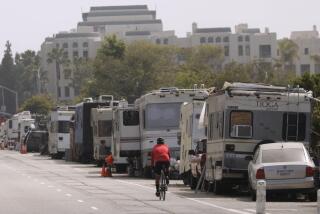People and Events
- Share via
Pliny (Mac) Barnes was threading through downtown Los Angeles on his way back to the Inland Empire with a busload of commuters when he received a phone call. “I’ve got some good news and some bad news,” he told his passengers. “The good news is that the governor just signed the bill. The bad news is that I forgot to bring the champagne.”
There were some good-natured boos.
Barnes, 48, of Redlands, is the bank vice president who turned an ordinary car pool into a bus service for about 40 people who work in Los Angeles but live in places like Redlands, San Bernardino and Ontario.
His passengers pay an average of $6.50 a day, depending on where they live, but Barnes says he makes no profit. They say they enjoy the comfort, convenience and congeniality.
All that did not ease the mind of an RTD inspector who spotted the bus and reported Barnes to the state Public Utilities Commission. The PUC accused him of running a commercial bus service without a permit, which could mean six months in jail and/or a $1,000 fine. Trial is scheduled for June 13.
To the rescue came Assemblyman Bill Leonard (R-Redlands) with an urgency measure making life easier for operators such as Barnes. The bill was passed and signed by Gov. George Deukmejian on Tuesday. It amends PUC requirements for small bus or van operations, cutting the filing fee from $500 to $75 and eliminating a requirement that the state receive 1% of gross revenues.
Annual CHP road inspections, a Class II bus driver’s license (which Barnes already has) and proper insurance remain mandatory.
Barnes hopes the PUC charges will be dropped now that the bill has passed.
Some of his passengers told him they plan a “blow-out” during the homebound trip on Friday.
“I hope they don’t mean a tire,” Barnes said.
Los Angeles City Council members haven’t figured out yet whether it would be worth the cost, but they unanimously approved a proposal to turn their big horseshoe-shaped meeting desk around so audiences can see their faces instead of their haircuts.
That way, said Councilwoman Joan Milke Flores, who made the suggestion, citizens could “see whether or not we look honest.”
Councilwoman Joy Picus agreed with Flores, calling the present setup “one of the worst possible designs for doing business. We sit here with our backs to the people we represent.”
Others said it might force them to pay more attention to citizens who show up to address them on various issues.
It was not, admittedly, one of the bigger crimes ever reported, but it was marked by what Temple City sheriff’s deputies felt was a certain meanness of spirit.
They reported that Armando Avila, 19, was in Rosemead selling ice cream out of an icebox mounted on the back of a large tricycle when two young men confronted him with a knife and a pistol, demanding his money.
Avila surrendered $10 and change, then watched as the pair took off on his vehicle--one pedaling and one riding on the handlebars.
A citizen saw the robbery and telephoned deputies.
Sgt. James Townsend said the officers had little trouble spotting the fleeing suspects a short distance away. One of them, however, managed to elude them on foot. The other, Hugo Gonzales, 21, was booked on suspicion of armed robbery.
Actors Dennis Weaver and Valerie Harper went to South-Central Los Angeles to help open a new warehouse for LIFE, the volunteer organization they founded five years ago to collect surplus food and distribute it to the poor.
Last Thanksgiving weekend, the organization’s former warehouse on South Broadway was left a shambles by vandals who made off with 50,000 pounds of groceries.
“We were in dire straits,” Weaver recalled Wednesday at the new center on Hawkins Circle. It was named for him.
LIFE (Love Is Feeding Everyone) gets much of its food from markets, which otherwise would throw away tons of perishables, and routes them to needy folks through various social service agencies and churches. A spokeswoman says it helps feed 30,000 people a week.
More to Read
Sign up for Essential California
The most important California stories and recommendations in your inbox every morning.
You may occasionally receive promotional content from the Los Angeles Times.













